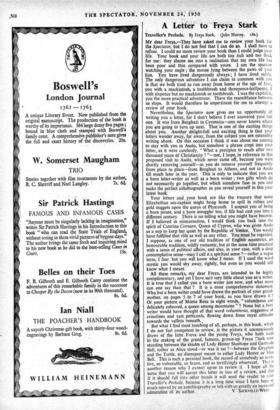A Letter to Freya Stark
Traveller's Prelude. By Freya Stark. (John Murray. 18e.) MY dear Freya,—They have asked me to review your book for the Spectator, but I do not feel that I can do so. I shall have to refuse. I could no more review your book than I could judge your life. Your book and your life are both too rich and too thick for me: they shame me into a realisation that my own life has been poor and thin compared with yours. I am the sparrow watching your eagle • the mouse lying between the paws of your lion. You have lived dangerously always ; I have lived safely. The only dangerous adventure I can claim in common with you is that we both tried to run away from home at the age of four, you with a mackintosh, a toothbrush and threepence-halfpenny, I with sixpence but no mackintosh or toothbrush. I was the capitalist, you the more practical adventurer. There the resemblance between us stops. It would therefore be impertinent for me to attempt a review of your book.
Nevertheless, the Spectator now gives me an opportunity of writing you a letter, for I don't believe I ever answered your last one. It was from Benghazi in Cyrenaica—one never knows where you are going to turn up next. That is one of the exciting things about you. Another delight-full and exciting thing is that your letters wander away, far away, from the subject you are ostensibly writing about. On this occasion I think it was about me coming to stay with you in Asolo, but somehow a phrase crept into your letter, as it were carelessly, "'What a precipice to reach after two thousand years of Christianity ! "—not, I hope, in reference to this proposed visit to Asolo, which never came off, because you were shortly removing yourself—as you do remove yourself frequently from place to place—from Benghazi to Athens, and not to Asolo till much later in the year. This is only to indicate that you are -a born letter-writer as well as a born writer ; two gifts which do not necessarily go together, but which somehow fuse in you and make the perfect autobiographer as you reveal yourself in this your latest book.
Your letters and your book are like the treasure that some Elizabethan sea-captain might bring home to spill in rubies and gold nuggets upon the quays of Plytrouth. I suspect you of being a born pirate, and a born smuggler too, if life had cast you into a different century. There is no telling what you might have become. If I believed in reincarnation, I would think you back into the spirit of Caterina Cornaro, Queen of Cyprus, who was given Asolo as a sop to keep her quiet by the Republic of Venice. You would have fulfilled that role as well as any other. You must be regarded, I suppose, as one of our old tradition of English eccentrics, an honourable tradition, wildly romantic, but at the same time practical with a sense of political affairs, and also, in your case, with a deep contemplative sense—may I call it a spiritual sense ?—rather a vague term, I fear but you will know what,! mean. If I used the word mystic you would shy away, rightly, but even so you would still know what I meant.
All these remarks, my dear Freya, are intended to be highly complimentary, and yet I have sail very little about you ava writer. It is true that I called you a born writer just now; and what more can one say than that ? It is a most comprehensive statement. Who but a born writer could have drawn the portrait of your grand- mother, on pages 5 to 7 of your book, as you have drawn it ? Or your picture of Monte Rosa in eight words, "voluminous and delicately coloured, a queen among mountains " ? None but a born writer would have thought of that word voluminous, suggestive of crinolines and vast petticoats, flowing down from royal altitudes towards the valleys beneath., But what I find most touching of all, perhaps, in this book, which I do not feel competent to review, is the picture it unconsciously draws of the little Freya and the young Freya, who both IA ent to the making of the grand, famous, grown-up Freya :lark now standing between the shades of Lady Hester Stanhope and Gertrude Bell, rather as Alice stood—or was it sat ?—between the Gryphon and the Turtle, no disrespect meant to either Lady Hester or Miss Bell. This is such a personal book, the record of somebody so sensi- tive, so vulnerable, so brave, and so terrifyingly observant. That is another reason why I cannot agree to review it. I hope all the 'same that you will accept this letter in lieu of a review, and that if it should fall into other hands it will send the reader to ■our Traveller's Prelude, because it is a long time since I have been se much moved by an autobiography or left with so greatly an increased admiration Of its author. V SACKVILLE-WEsT.














































































 Previous page
Previous page